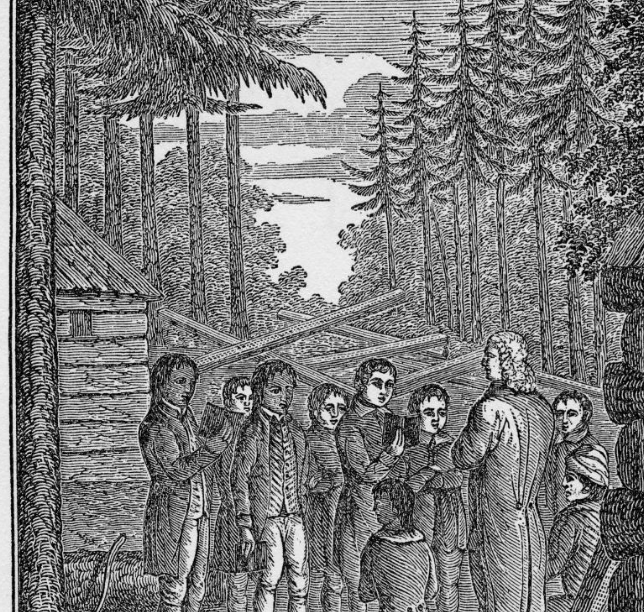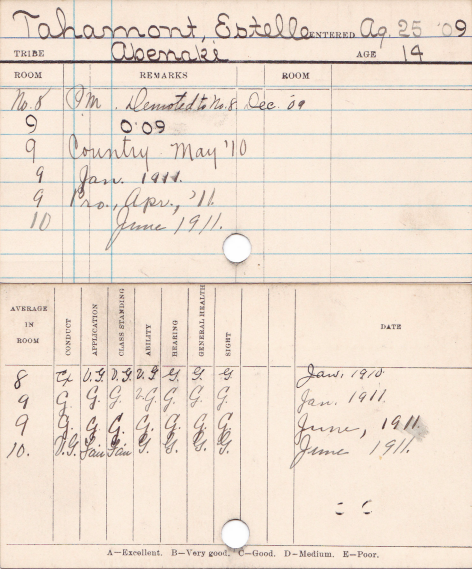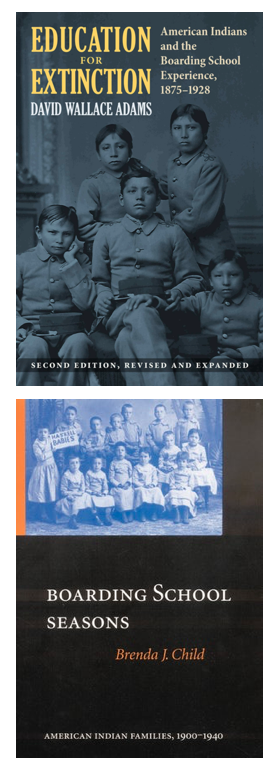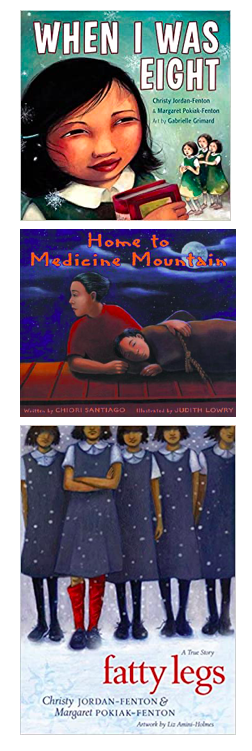This page is designed to share educational resources about the history and lasting impacts of residential institutions and child removal as strategies for assimilation and cultural genocide of Indigenous peoples. It provides links to articles, films, books, and teaching materials that provide historical context and offer further resources. Many of these resources contain disturbing details about residential and boarding schools and removal of Native children from their homes that may be triggering for Indigenous families and individuals who continue to heal from the harm caused by these histories. Resources for self-care and trauma from the National Native American Boarding School Healing Coalition can be found here, and also here. INHCC honors with gratitude and respect those who shared their stories in the resources below. We are committed to recognizing the atrocities committed against Native peoples by these systems and celebrating the survivance of all Indigenous people who have been—and continue to be—affected.
Historical Context
Pre-Boarding School Era
The relationship between “educational” institutions and assimilation/cultural genocide has long historical roots that predate the formal establishment of boarding schools in the United States. Through the 17th, 18th, and 19th centuries, missionary schools were founded throughout New England to “civilize” and convert Indigenous students.

- Context from Wikipedia on early mission schools
- The Harvard Indian College — This online exhibition shares the history of the Harvard Indian College, which was established at Harvard in the 1640s to educate and convert Indigenous people, and the stories of its Native students.
- The Indian School at William & Mary
- The founding of Dartmouth College — Dartmouth College began when Eleazar Wheelock relocated Moor’s Indian Charity School to Hanover, with a charter “for the education and instruction of Youth of the Indian Tribes in this Land in reading, writing & all parts of Learning which shall appear necessary and expedient for civilizing & christianizing Children of Pagans”
Image: “Founding of Dartmouth College,” from Reed Digital Collections
Boarding School Era
From the early 1800s into the mid-1900s, many thousands of Indigenous children were taken away from their communities and forced to attend boarding schools in the United States and Canada. At these institutions, also known as residential schools and also called assimilation camps by many Indigenous peoples, Indigenous students were stripped of their cultural identities, punished for speaking their language, and abused physically, emotionally, mentally, and sexually. Many students passed away at these institutions, never returning to their families. Now, survivors and their descendants are still healing from the traumas wrought by this federal strategy for forced assimilation.

The Carlisle Industrial Indian School
The Carlisle Indian Industrial School, located in Carlisle, Pennsylvania, was founded in 1879 under the US government by General Richard Henry Pratt, whose motto was, famously and disturbingly, “Kill the Indian, save the Man.” Over the next 39 years, more than 10,000 Indigenous children from more than 140 tribes attended Carlisle. It served as a model for the Canadian residential school system.
Image: Progress report for Estelle Tahamont, an Abenaki girl who attended Carlisle Industrial Indian School. From the Digital Resource Center.
- Digital Resource Center — Searchable database from Dickinson College that includes student records, images, publications, documents, lists & ledgers, teaching resources, and cemetery einformation.
- Where are the Indigenous children who never came home? — High Country News, September 25 2018
- Tribal enrollment tally for Carlisle Indian Industrial School
- Indian Boarding Schools’ Traumatic Legacy, and the Fight to Get Native Ancestors Back — NPR, August 28 2021
From the National American Boarding School Healing Coalition:
- List of Indian Boarding Schools in the United States
- Resource database center — Digital archive of historical documents, academic research, bibliographies and finding aids, media materials, personal histories and stories, learning tools, and materials from events, meetings, and conferences.
- Article on the impact of historical trauma related to boarding schools
How Native students fought back against abuse and assimilation at US boarding schools — The Conversation, August 12 2021
Death by Civilization — The Atlantic, March 8 2019
Away From Home: American Indian Boarding School Stories — Online exhibit by the Heard Museum
Uncovering the Unspoken Traumas of Native American Boarding Schools — New Hampshire Public Radio, June 29 2021
History of Residential Schools in Canada:
- ‘Cultural genocide’: the shameful history of Canada’s residential schools — mapped — The Guardian, September 6 2021
- Timeline from the Indian Residential School History & Dialogue Centre
Adoption, Foster Care, and Orphanages
Across time and space, the strategies used by colonial governments to achieve assimilation and cultural genocide have varied, but removal of Indigenous children from their homes and separation from their cultures remain a point of continuity. For decades, Indigenous children have been disproportionately separated from their families and communities through adoption, foster care, and placement in orphanages—a process which is ongoing today.
Films and teaching guides from the Upstander Project: Dawnland, Dear Georgina, and First Light (see “Films” and “Educational Tools” sections below)
This Land podcast by Crooked Media — Season 2 tracks “how the far right is using Native children to attack American Indian tribes and advance a conservative agenda.”
The work of Vernon Carter — a UNH professor who has published research on the removal of Native American and Alaskan Native children from their homes still occurring today.
- Urban American Indian/Alaskan Natives compared to non-Indians in out-of-home care (Child Welfare, 2011)
- Factors predicting placement of urban American Indian/Alaskan Natives into out-of-home care (Children and Youth Services Review, 2010)
- Prediction of placement into out-of-home care for American Indian/Alaskan Natives compared to non-Indians (Children and Youth Services Review, 2009)
- Comparison of American Indian/Alaskan Natives to Non-Indians in Out-of-Home Care (Families in Society: The Journal of Contemporary Social Services, 2009)
- Child Protective Services, in Contemporary Issues in Child Welfare: American Indian and Canadian Aboriginal Contexts — with Vandna Singh, 2017
Judge William Thorne on the History and Healing of American Indian Families — Podcast highlighting continuities across time in federal policies’ devastating impacts on Indigenous American children, families, and culture.
ICWA Personal Stories Video Project — Video series is a multi-part digital storytelling project that features Native families sharing their stories of family upheaval, perseverance, healing, and resilience in the face of threats to their well-being.History and Impacts of Child Removal — from Wabanaki REACH.
Educational Tools
Recommended curricula, lesson plans, and teaching tips for educators and parents.
- Dawnland Teacher’s Guide — 12 lessons to accompany the Dawnland film (see Films section below)
- Truth and Healing Curriculum from the National Native American Boarding School Healing Coalition — 4 lessons (themed: History, Impacts, Stories, and Healing) on Indian boarding schools in the United States; sectioned into 3 learning levels (primary, middle, and upper grades)
- The Forgotten History of Indigenous Boarding Schools — lesson plan from the New York Times
- Each School Had a Graveyard: Native American Boarding Schools — lesson plan from Civil Rights Teaching
- How to talk to your children about residential schools — from Mashable
- Lesson plans from the Carlisle Indian School Digital Resource Center
- Themed learning resources and activities from the Upstander Project — designed to accompany First Light documentary short (see Films section below); themes include boarding schools, the Indian adoption project, Native children in foster care, the Truth & Reconciliation Commission in Maine, and more
- Decolonizing Curricular Resources: A Bibliography for Teaching and Learning Native American and Indigenous Studies in New England — Resource list for Residential Schools and the 60s Scoop, by the Karuna Center for Peacebuilding.
Books
List of 48 fiction, nonfiction, poetry, and children’s books — curated by David A. Robertson, a Cree author based in Winnipeg

Nonfiction Books & Articles
- Education for Extinction: American Indians and the Boarding School Experience, 1875 – 1928 — David Wallace Adams
- They Called It Prairie Light: The Story of Chilocco Indian School — K. Tsianina Lomawaima
- Boarding School Seasons: American Indian Families, 1900 – 1940 — Brenda J. Child
- Kill the Indian, Save the Man: The Genocidal Impact of American Indian Residential Schools — Ward Churchill
- The School Days of an Indian Girl — primary source account by Zitkala-Sa, a Yankton Dakota boarding school survivor; available online here
- The Boarding School as Metaphor — Brenda J. Child (Journal of American Indian Education, 2018)
- Indian Boarding Schools, Before and After: A Personal Introduction — K. Tsianina Lomawaima (Journal of American Indian Education, 2018)
- Survival Schools: The American Indian Movement and Community Education in the Twin Cities — Julie L. Davis

Children’s Books:
- When I was Eight – YouTube — For grades 1-5
- Not My Girl – YouTube
- When We Were Alone Book Final Edit – YouTube
- I Am Not a Number – YouTube (Gaawin Gindaaswin Ndaawsii) — For grades 3-6; two versions available (English & dual-language Nishnaabemwin [Ojibwe] Nbisling dialect and English)
- Shin chi’s Canoe – YouTube
- Shi-shi-etko – YouTube
- Stolen Words – YouTube
- I Am Loved – Inhabit Media (inhabitbooks.com)
- Home to Medicine Mountain — For grades 1-5
- Fatty Legs: A True Story — For grades 4-8
- As Long as the Rivers Flow — For grades 3-6; sequel is Good Buffalo Bay
- My Name is Seepeetza — For grades 4-8
- No Parole Today — For grades 7 and up
Films
Dawnland — 86 minutes; comes with free teacher’s guide and viewer’s guide; follows the Truth and Reconciliation Commission in Maine
Dear Georgina — 15 minutes; follows the story of a Passamaquoddy elder, who was removed from her home at age two by child protection services, as she connects with her past and her culture
First Light — 13 minutes; documents the practices used by the US government to remove Native children from their tribes, from the 1800s to today
Rhymes for Young Ghouls — 85 minutes; indie drama/horror film that tells the fictional story of a teenager’s plot for revenge
The Thick Dark Fog — 56 minutes; follows the healing journey of Walter Littlemoon, a Lakota boarding school survivor
Older Than America — 101 minutes; by Cree filmmaker Georgina Lightning; a suspense drama film that explores the devastating personal and cultural effects of boarding schools on the members of a Native family in Minnesota
Indian Horse — 100 minutes; film adaptation of 2012 novel by author Richard Wagamese (Ojibwe); follows the story of a young First Nations boy who survives the residential school system to become a star ice hockey player
We Were Children — 86 minutes; by the National Film Board of Canada; follows the stories of two children taken from their homes and brought to boarding schools
Holy Angels — 14 minutes; by the National Film Board of Canada
Canadian Shame: A History of Residential Schools (TEDx Talk) — 15 minutes
My Stolen Childhood, and a Life to Rebuild (TEDx Talk) — 15 minutes; Indigenous Australian woman shares her own experience being placed in an orphanage by authorities as a child
Crimes against children at residential school: The truth about St. Anne’s — 22 minutes
National Film Board of Canada: films related to residential schools
In the News
Canada settles with indigenous ‘Sixties Scoop’ victims — BBC, October 6 2017
Reflecting on the Maine-Wabanaki Child Welfare TRC Commission Five Years Later — Native News Online, November 5 2020
Remains of 215 children found buried at former B.C. residential school, First Nation says — CBC, May 27 2021
“We won’t forget about the children” — Indian Country Today, June 6 2021
Native Americans to Feds: Own Up to America’s Indian School History — VOA News, June 16 2021
The Remains of 10 Children at the Carlisle Indian Boarding School Are Returning Home — Native News Online, June 17 2021
Canada: 751 unmarked graves found at residential school — BBC, June 24 2021
U.S. boarding schools to be investigated — Indian Country Today, June 22 2021
Why Canada is reforming indigenous foster care — BBC, July 11 2021
Canada, US differ on boarding schools — Indian Country Today, July 18 2021
Churches reckon with traumatic legacy of boarding schools — Indian Country Today, July 25 2021
Calls to search for remains at former boarding schools — Indian Country Today, August 4 2021
Legal group backs review of US boarding schools — Indian Country Today, August 10 2021
Canada indigenous children’s compensation order upheld — BBC, September 29 2021